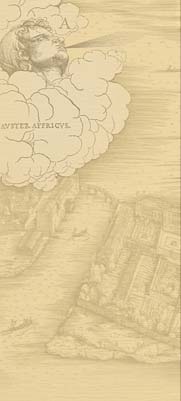Glossary
- abacus school
- A type of school that developed in 13th-century Italy that taught reading and writing, practical arithmetic, algebra, and geometry to the children of merchants and artisans.
- aft
- Toward the stern, or rear, of a vessel.
- Aigues Mortes
- This fortified city—once the king of France's only Mediterranean port—was one of a string of ports along the Mediterranean coasts of France and Spain visited by Venetian bringing goods from the East. The main product of Aigues Mortes was salt, but the Venetians also traded local produce as they traveled along Europe's southwestern coast, as far as Valencia and back.
- Alexandria
- Founded by Alexander the Great around 334 B.C.E., Alexandria became Egypt's chief seaport. During Michael's time, it was controlled by the sultan of Egypt. Alexandria lay at the western end of a major trade route extending across Egypt and down the Red Sea to India. The most important goods traded for here were spices from the East, the most valuable being pepper.
- Arabic numerals
- The symbols 1, 2, 3, 4, 5, 6, 7, 8, 9, and 0. Sometimes called Hindu numbers because of their actual origins in India around 400 B.C.E.
- armiraio
- The senior non-noble officer in charge of the movement of a galley fleet and responsible for the welfare and discipline of the crews.
- arsella
- A small Venetian ship, literally "clam." Pl. arselle.
- ballast
- Heavy weight or substance placed in the hold to steady the ship by lowering its center of gravity.
- Bayazed I
- 1347-1403; sultan of the Ottoman Empire, 1389-1402. Nicknamed "Lightning," he ascended the throne after the assassination of his father, Murad I. His bellicose reign saw vast expansions of Ottoman territory in Europe and Asia Minor. He was captured by Timur in the Battle of Ankara in 1402 and died a year later.
- Beirut
- Founded by the Phoenicians, Beirut had one of the best harbors in the eastern Mediterranean. The sultan of Egypt controlled it during Michael's lifetime. Beirut sat at the end of a long caravan route across Mesopotamia to Persia and Central Asia. Goods traded for here included cotton, silk, drugs, and spices.
- bilge
- The bottom part of a ship's hull, on which it would rest if aground.
- block and tackle
- An arrangement of pulley-blocks and ropes used to hoist heavy objects.
- bow
- The forward end of a ship.
- Bruges
- A dominant center of trade in late-medieval Northern Europe, this city in Flanders (now part of Belgium) was the main destination of the galleys of Flanders. The dukes of Burgundy controlled Bruges. Goods traded for in Bruges included wool and woolen cloths.
- Byzantine Empire
- The eastern, Greek-speaking half of the Roman Empire which survived the fall of the western part of the Empire in the early Middle Ages, principally comprising Greece, much of the Balkans, and Asia Minor. The capture of Constantinople by the Ottoman Turks in 1453 marked the end of the Byzantine Empire.
- capstan
- A wooden wheel with an axle, around which a rope is wound, used for hoisting heavy weights.
- captain of the fleet
- The noble officer in charge of an entire galley fleet; admiral. The captain of each merchant fleet was given a salary and forbidden to partake in trade. The captain of the Guard fleet was called the Captain of the Gulf; in certain times his title was Captain General of the Gulf and he was the highest ranking Venetian military officer.
- coasting
- A basic method of navigating by sailing close to land or along coasts during a voyage.
- cog
- A square-rigged, round-bottom boat used mainly for bulk trade; usually operated privately rather than by the Venetian state.
- comito
- A senior non-noble officer who commanded a galley's crew.
- computus
- The medieval Latin name given to computations involving the ecclesiastical calendar, particularly those determining the date of Easter.
- Constantinople
- Standing at the southern end of the narrow straits known as the Bosphorus, Constantinople controlled access to the Black Sea and was a commercial crossroads between Europe and Asia. The city remained the Byzantine Empire's capital until the Ottoman Turks captured it in 1453, giving the city its modern name of Istanbul.
- convoy
- A group of vessels traveling together, sometimes escorted by warships.
- corsair
- A private sailor licensed by a government to attack enemy ships and coasts.
- crossbow
- A medieval weapon consisting of a bow fixed crosswise on a grooved wooden stock, with a mechanical means of pulling the bowstring and firing a bolt or arrow.











